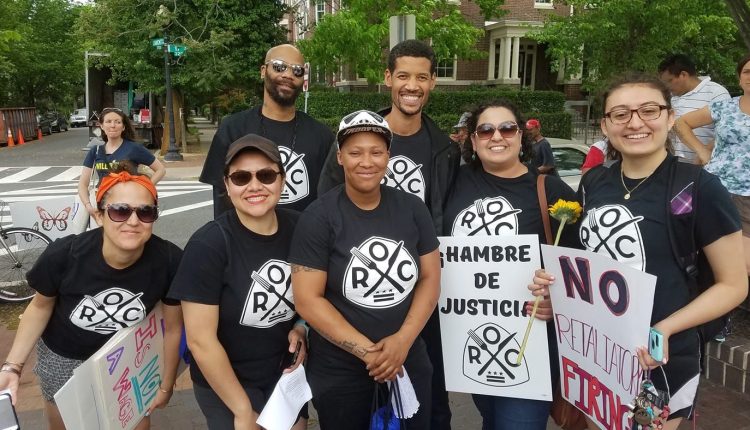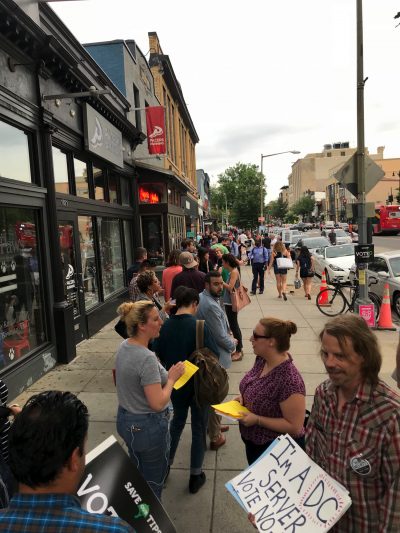
Tipped minimum wage debate hails from long-developing advocacy group
Voters on Tuesday will decide the fate of Initiative 77, which proposes to gradually eliminate the city’s tipped minimum wage and close the existing gap between tipped and non-tipped workers. The initiative ended up on the DC primary ballot thanks to fierce, concentrated advocacy from Restaurant Opportunities Centers United, a national coalition of more than 25,000 workers, 3,000 restaurant owners and 11 regional chapters.
Supporters of the initiative have rallied around the coalition’s talking points: Workers deserve livable salaries upfront; tipping culture perpetuates harassment against women and minorities; and other states without the tipped minimum wage have seen their restaurant industries thrive.

Critics, meanwhile, have regarded the coalition with skepticism. At a debate last month, DC9 tipped employee Sheena Wills accused Diana Ramirez, director of the coalition’s DC chapter, of capitalizing on the political fervor around the #MeToo movement to build momentum for her agenda — without listening “to the voices in the room.” These voices, Wills said, rejected the direct connection between tipping and harassment.
When Ramirez pointed to studies indicating that eliminating the tipped minimum wage could reduce harassment in the service industry by 50 percent, one onlooker murmured dismissively, “Yeah, according to your studies.”
The initiative could face an uphill battle, having failed to secure support from Mayor Muriel Bowser and a majority of the 13 DC Council members, only one of whom (Ward 3’s Mary Cheh) has publicly come out in favor.
Ed Lazere, candidate for council chairman against incumbent Phil Mendelson, backs the initiative and appeared at the May debate. Jeremiah Lowery, candidate for Anita Bonds’ at-large seat, also supports Initiative 77.
If the initiative passes, the victory will be owed in large part to ROC’s efforts, which reach back 14 years in DC and close to two decades nationwide. If it fails, the organization may have to re-evaluate its approach or shift to other priorities. It wouldn’t be the first time — a look at the national organization’s evolution highlights tactics that have shifted in scope and focus, even as clients and goals have been consistent.
ORIGINS
The coalition first took major action shortly after Sept. 11, 2001, in New York. Windows on the World, a restaurant originated by Joe Baum of the Four Seasons and the Rainbow Room, occupied the top floors of the North Tower of the World Trade Center from 1976 until 2001. In the aftermath of the tragedy, the restaurant’s owner, David Emil, promised its 350 employees — many of whom were immigrants — that they would find work in his next venture. But less than a year later, when Emil opened the new restaurant Noche in Times Square with 90 employees, only some of those slots were occupied by former Windows employees, though many more had applied.
The Restaurant Opportunities Center of New York, as it was then called, positioned itself as an advocate for hospitality workers who had lost employment as a result of the events of Sept. 11, 2001. Several workers accused Noche of anti-union bias, though Emil strongly disputed the notion, saying that some former Windows employees had turned down his job offers and that others weren’t qualified. Noche closed in 2004.
The coalition protested the restaurant’s “fancy” red-carpet launch event, according to Ramirez. That public display galvanized the coalition to form a 501c3 nonprofit that, for the next seven years, “went after bad actors,” Ramirez said. That aggressive spirit lives on today in the form of criticisms of inadequate enforcement of wage and tip theft in DC and elsewhere for years.
From the start, ROC saw empowering immigrants as central to its mission, said co-founder and current co-director Saru Jayaraman. ROC’s first member, Sekou Siby, a Windows worker, hails from the Ivory Coast of Africa; he now serves as the national organization’s executive director. Jayaraman points to him as an emblem of the organization’s long-standing commitment to diverse constituents.
“We are explicit about racial equity and racial justice, but not exclusive in any way,” Jayaraman said. “We started with people who are most affected [by discrimination and disenfranchisement] and grew over time to include everybody in the industry.”
The team’s efforts were confined to New York City until 2005, when victims of Hurricane Katrina cold-called the organization asking for help securing stable employment amid massive upheaval in New Orleans and surrounding communities. ROC declined at first, Jayaraman said, but eventually the team realized its potential to serve a broader population.
“Every time we expanded to a new city, it was because workers called us from that city and said, ‘We need you here,’” Jayaraman said. ROC United now has local chapters in the San Francisco Bay Area, Boston, Chicago, Los Angeles, Detroit, New Orleans, Philadelphia, Seattle and DC.
CLOSE TO HOME
Eventually, according to several ROC members, the pattern of abuses in different parts of the country became so evident that the organization began to engage in broader research into the forces at work in the industry — a ‘think-tank’ approach.
The formation of the DC chapter coincided with that shift in mission. ROC DC got its start thanks to two graduate students from the University of California at Berkeley. Bonnie Kwon and Meghana Reddy saw ROC’s co-founder Saru Jayaraman, a UC Berkeley alum, speak at a food justice conference, and found her messages so inspiring that they decided to move to DC and start their own chapter.
A few years later, Nikki Lewis had just been let go from a restaurant job with only a day’s notice of the establishment’s closure. She was on Craigslist searching for a job when she saw a notice from the coalition’s new chapter seeking teachers for skills classes in hospitality, bartending, fine dining and English as a second language to local restaurant workers. Lewis, a black woman, felt different during this experience in a way that made her want to continue.
“It was the first time in my life that I had ever been in a space where people of color and white people were talking about the issues that directly impacted my life,” said Lewis, who now serves as executive director of DC Jobs for Justice and membership engagement lead for the Health Environment Agriculture and Labor (HEAL) Food Alliance, which includes ROC. “It completely resonated with my experience in the industry.”
In 2009, Lewis became one of the local chapter’s full-fledged members, and soon thereafter helped forge a partnership to offer classes in restaurant spaces owned by local celebrity José Andrés, who recently voiced his opposition to Initiative 77.
“Increasing the tipped minimum wage will only make the current wage disparity more extreme and place downward pressure on small business margins,” Andrés told local media in a statement.
In addition to offering classes, Lewis dove headfirst into the research that would form the basis of the organization’s fight for the tipped minimum wage.
The survey project Behind the Kitchen Door entailed surveys of 700 local restaurants. Most of the research was conducted on foot, with Lewis and others going door to door to ask restaurants for details on their employees and policies. Lewis had worked in DC’s restaurant industry for a decade, giving her a “a Rolodex of restaurant workers.” She received a $200 stipend for every 15 surveys she completed. Ultimately she contributed half of the surveys in the final report — one of several ROC developed to cite in its activism.
Lewis recalls one day when she walked around Dupont Circle asking each restaurant to point her to its workers of color. One restaurant after another told her their black employees weren’t working that day. It dawned on her that in several of her previous jobs including Ruth’s Chris Steakhouse and Rosa Mexicano, she had been the only black woman on staff.
“This issue is very near and dear to my heart,” Lewis said of Initiative 77.
For her part, Ramirez has served as ROC DC director for the past two years, and prior to that worked for Texas Rep. Lloyd Doggett and for the Congressional Hispanic Caucus Institute.
Ramirez has been passionate about securing rights for tipped workers since she watched sexual harassment take a toll on her sister in the El Paso, Texas, restaurant industry. After working in various tipped positions at three national chain restaurants, her sister slid into substance abuse and had an unplanned child at 19. She’s now a registered nurse in Oakland and has a 15-year-old son. But the road she took to those victories convinced Ramirez of the need for advocacy.
“I joined ROC to help improve the industry for young women like my sister — who, had they been earning the minimum wage from their employer, would not tolerate so much horrible behavior from the restaurant industry,” Ramirez said.
LOOKING AHEAD
From the organization’s inception, the National Restaurant Association — provocatively characterized by ROC affiliates as “the other NRA” — has served as the chief opposing force. Jayaraman said she and her colleagues have been on the receiving end of burdensome lawsuits and congressional investigations from the service-industry lobby, which has launched the counterweight organization ROC Exposed and contributed, along with the Restaurant Association Metropolitan Washington, to the Save Our Tips campaign currently opposing DC’s Initiative 77. Jayaraman attributes some of the local opposition to Initiative 77 — even from tipped workers themselves, who would be most immediately affected by the policy change — to a relatively new strategy from the restaurant lobby to spread fear among those who would most benefit from ROC advocacy.
A recent victory like eliminating the tipped minimum wage in Maine was undercut by a successful effort driven by workers last year to reverse the effects of that 2016 law. Once again, Jayaraman contends the backlash can be traced to rhetoric from the Restaurant Association. Tipped workers who oppose Initiative 77 and other such efforts, meanwhile, point to arguments from economists against transforming their compensation system, and implore advocates for the initiative to hear them out on their own terms.
In the meantime, ROC United has ascended even more into the public consciousness as the #MeToo and #TimesUp movements have generated nationwide conversations around workplace abuses and sexual misconduct. Jayaraman attended the Golden Globes with actress Amy Poehler, a former restaurant worker, and got a shout-out from host Seth Meyers during the opening monologue. Then, too, not everyone was pleased, with some workers arguing that they don’t need an outside observer to advocate on their behalf and that the issues cited in favor of Initiative 77 aren’t as severe as portrayed.
Though the DC coalition has centered its current strain of activism around the tipped minimum wage, it plans to be flexible and eventually address issues of sick time and health care for tipped employees, Ramirez said. Jayaraman believes the organization can overcome its toughest critics.
“Gandhi said, ‘First they laugh at you, then they ignore you, then they fight you, then you win,’” Jayaraman said. “I have never seen [the National Restaurant Association] fight this hard, with this much money. They are seeing that we’re gaining momentum. It has to do with a lot of employers joining forces with us. I think there’s fear, fear of change that maybe they see is on the horizon.”


Comments are closed.